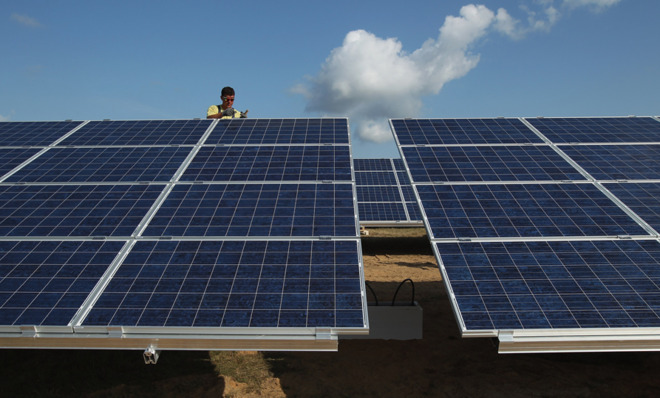3 reasons to feel hopeful about the future of clean energy
It looks like all that funding is paying off

A free daily email with the biggest news stories of the day – and the best features from TheWeek.com
You are now subscribed
Your newsletter sign-up was successful
There are plenty of reasons for pessimism when it comes to climate change: The U.N.'s latest report laid out, in no uncertain terms, that sea levels could rise as much as three feet by 2100 — higher than populated islands like the Bahamas. Furthermore, it's almost definitely our fault; climate scientists at this point are 95 percent sure that humanity is driving the rise in greenhouse gases.
The good news: Humanity — at least some of it — is also working really hard to limit emissions. Here are three recent developments that will make you feel hopeful about the chances for a clean energy future:
1. More scientists are winning renewable energy patents than ever before
The Week
Escape your echo chamber. Get the facts behind the news, plus analysis from multiple perspectives.

Sign up for The Week's Free Newsletters
From our morning news briefing to a weekly Good News Newsletter, get the best of The Week delivered directly to your inbox.
From our morning news briefing to a weekly Good News Newsletter, get the best of The Week delivered directly to your inbox.
New research from MIT and the Santa Fe Institute shows that the number of patents issued for renewable-energy technologies has gone way up in the last decade.
After compiling 73,000 energy-related patents issued in over 100 countries between 1970 and 2009, researchers found that "the increase was most dramatic in patents related to renewable energy," according to MIT, with solar and wind technologies leading the pack.
Meanwhile, the number of patents issued for fossil-fuel technologies grew less sharply, and those in nuclear energy didn't grow at all. MIT lays out the growth for the U.S.:
Overall, renewable-energy patents in the United States increased from fewer than 200 per year in the period from 1975 to 2000 to more than 1,000 annually by 2009. By comparison, there were about 300 fossil-fuel-related patents in 2009, up from about 100 a year in earlier decades. The fraction of all patents accounted for by energy is also increasing. [MIT]
So what drove the dramatic shift? An Inconvenient Truth winning an Oscar? Hurricane Katrina?
A free daily email with the biggest news stories of the day – and the best features from TheWeek.com
Actually, neither. The recent boom in renewable energy technology can be traced all the way back to surges in investment funding following the oil embargo in 1973. "A lot of work was done in the ’70s and ’80s, a lot of effort was put in, and we’re still benefiting from that," Jessika Trancik, an assistant professor of engineering systems at MIT and co-author of the report, told MIT.
2. Americans use way less oil than they used to
A new study by the National Resources Defense Council shows that because of advancements in energy efficiency — such as vehicles with efficient engines and refrigerators that can keep cool on a fourth of the energy — the U.S.'s energy use peaked in 2007. "Americans used less energy in 2012 then in 1999, even though the economy grew by more than 25 percent (adjusted for inflation) over that period," says Midwest Energy News. Equally promising was how the energy data broke down. For example, "Americans used less oil in 2012 than in 1973, even though the economy tripled in size over that period."
3. The price of solar panels is in free fall
The biggest complaint about solar used to be that it was prohibitively expensive — but that's changed dramatically in the last few decades. After costing $76.67/watt in 1977, solar had fallen to $4/watt by 2008. Now? Just $0.48/watt.
As John Aziz at The Week pointed out earlier this year:
If the trend stays on track for another eight to 10 years, solar generated electricity in the U.S. will descend to a level of $120 per MW/h [megawatt per hour] — competitive with coal and nuclear — by 2020, or even 2015 for the sunniest parts of America. If prices continue to fall over the next 20 years, solar costs will be half that of coal (and have the added benefits of zero carbon emissions, zero mining costs, and zero scarcity). [The Week]
And it's not just a trend in the U.S. either — solar is a growing source of electricity in Japan, where it's receiving government subsidies, and various countries in Europe as well. There's new evidence that a solar market is even starting to grow in Mexico, one of the world's top 10 energy producers. "A global surplus of solar panels has made them cheaper, while the costly oil-fired plants common in areas such as Durango, Sonora and southern Baja California make solar a competitive option," says Bloomberg.
Even IKEA, the largest furniture retailer in the world, is starting to sell solar panels to the masses.
Carmel Lobello is the business editor at TheWeek.com. Previously, she was an editor at DeathandTaxesMag.com.
-
 What to know before filing your own taxes for the first time
What to know before filing your own taxes for the first timethe explainer Tackle this financial milestone with confidence
-
 The biggest box office flops of the 21st century
The biggest box office flops of the 21st centuryin depth Unnecessary remakes and turgid, expensive CGI-fests highlight this list of these most notorious box-office losers
-
 The 10 most infamous abductions in modern history
The 10 most infamous abductions in modern historyin depth The taking of Savannah Guthrie’s mother, Nancy, is the latest in a long string of high-profile kidnappings